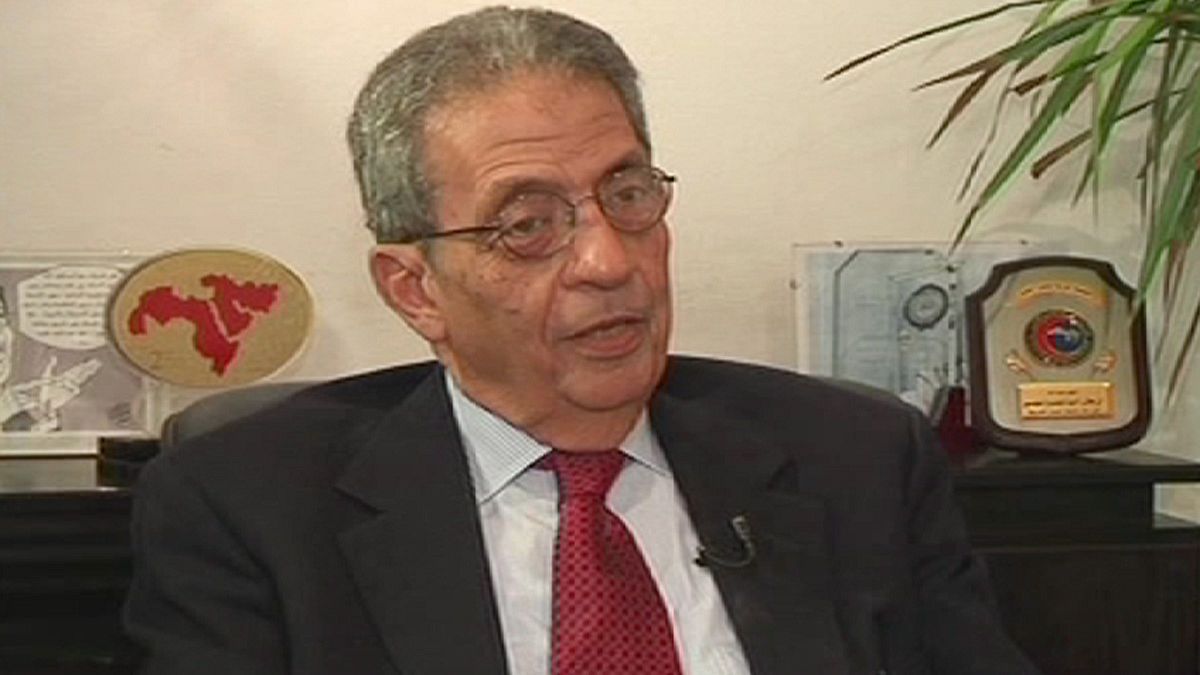The former head of the Arab League, Amr Moussa, has been talking to euronews reporter Mohammed Shaikhibrahim about the current unrest in Egypt.
The 75-year-old led the Arab League until he stepped down in mid-2011 to run as a candidate in Egypt’s presidential election.
Mohammed Shaikhibrahim: “Amr Moussa, you helped form the National Front for the Salvation of the Revolution, or the National Rescue Front, a political alliance of 35 groups. What was the idea behind forming it?”
Amr Moussa: “The front co-ordinates and works with all groups, parties and politicians who have the same thoughts, think in the same way. That is within the framework of what we can do within Egypt in the very bad conditions which we are experiencing now. The beginning of the crisis was the Constitutional Declaration which was issued on November 21. It was rejected by the opposition in Egypt because it is considered to be a move against democracy.”
euronews: “Do you think that there is a premeditated intention by the Muslim Brotherhood to take full control of the state?”
Amr Moussa: “Any party which wins an election aims to put its supporters in positions of power. That is understandable, it is the case in Egypt and it happens whether here or in any other state as in America. But there is a difference between putting your supporters in those positions or trying to hide or change the face of the entire state.”
euronews: “Why don’t you, the opposition give the president a chance to achieve his programme?”
Amr Moussa: “We accept this, it is one of his rights to have a chance. He is the elected president but we didn’t see anything from his programme. We didn’t issue the constitution referendum or manage the constitution. We are just citizens bound together in different political parties. But he, the president, is the authority, the person who makes the decisions.
We didn’t challenge his authority, we only oppose some of his policies which have appeared in the constitutional referendum. We don’t want to restrict him, on the contrary we, the opposition, are ready to provide assistance. I am one of his opponents and I am ready to offer help to make the democratic project, whether with a president from the Muslim Brotherhood or not.”
euronews: “The Egyptian president invited you to take part in national dialogue. Why did you not respond?”
Amr Moussa: “It is not the type of dialogue we want or require. We want to look specifically at topics that I mentioned earlier, not a general invitation to speak or make statements. We want a reunion, this is what we want, but that should come after we sit down and finish talking on the specific problems which have arisen. We didn’t say that we are against the national dialogue; the principle of dialogue is acceptable. But this speedy way of putting things in front of the opposition and then acting and deciding as quickly as possible to accept them, this has become a pattern. We have not had enough time to consider these things.”
euronews: “Opposition supporters are now demanding to bring down the President. Is that your demand?”
Amr Moussa: “The National Rescue Front has not called for him to go and has not considered it. The subject is outside the framework of our work. But there are voices demanding that he go; we heard that from the chants during demonstrations. There are people who have are in despair and any analysis of the subject with them is to no avail.”
euronews: “Even though you reject the constitutional referendum, a large section of the opposition did participate in the referendum?”
Amr Moussa: “I am one of those who rejects the constitutional referendum. There were two opinions – to boycott it or to take part and vote no. The majority decided to vote and say no. And I said that before the opposition’s decision to choose to vote no. The participation and opposition is very important to build democracy if we want Egypt to move forward. The most important thing is the participation, isn’t that within the rules of the game? So we should agree. But If the opposition is pushed into a corner, or there are matters which affect the country badly, then there will a stronger reaction than in the past and I hope everyone will understand that. The whole world and Egypt will not tolerate my brother Mohamed Mursi.”
euronews: “Mr Moussa, who governs Egypt now: is it the Egyptian President Mohamed Mursi, or the leader of the Muslim Brotherhood as the opposition claims?”
Amr Moussa: “I think that the Muslim Brotherhood are governing, but President Mohamed Mursi among their leaders is sitting in his office waiting for orders. I imagine this, but I do not have a degree in the management methods of the Muslim Brotherhood. However there is a trend that probably the majority party of the Muslim Brotherhood – in the name of freedom, justice and the head of state- rule together.”


